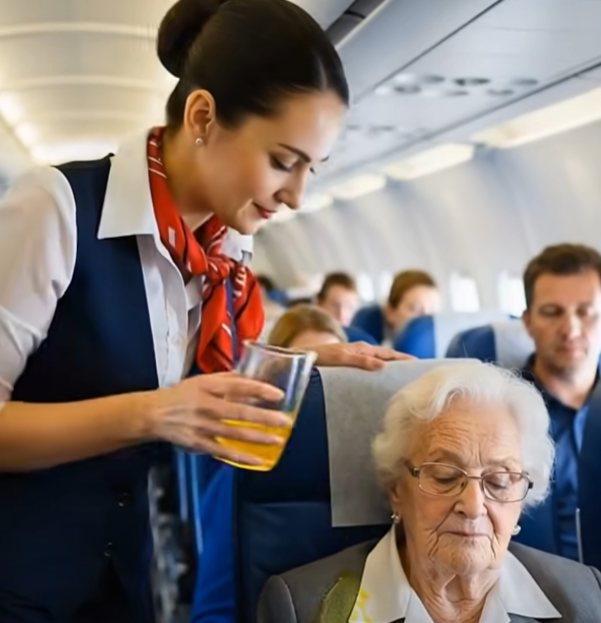Sometimes, a single moment reveals everything about a person — and sometimes, it changes an entire system. That’s exactly what happened to Eleanor Vance, a retired senior FAA safety inspector who thought she’d seen it all. She’d spent decades enforcing the rules that kept millions of passengers safe, from investigating flight incidents to auditing airline operations. But one ordinary afternoon flight reminded her that professionalism and respect are just as vital to aviation safety as any checklist or regulation.
Eleanor boarded a domestic flight from Atlanta to Seattle, dressed neatly in a navy-blue suit. Her posture carried quiet authority, but she wasn’t traveling on business — at least not officially. After forty years in the industry, she’d retired from full-time service, now working occasionally as a private safety consultant. This trip was personal — a long-overdue visit to her daughter and grandkids.
She settled into her first-class seat, opened a folder of notes she’d been reviewing, and pressed the call button. When the head flight attendant approached, Eleanor smiled politely. “Just some water, please,” she said.
The woman — her name tag read Victoria Hale — gave a thin, dismissive smile. “Water?” she repeated, almost mocking. “Sure, ma’am.” She disappeared toward the galley.
A few moments later, she returned with a tray. But instead of handing over the requested water, she leaned in, smirked again, and tilted a cup of orange juice directly onto Eleanor’s lap. The cold liquid soaked her suit, her papers, and her open briefcase. Gasps rippled through the cabin. The silence that followed was suffocating.
Eleanor blinked, then looked up. “That was unnecessary,” she said calmly.
Victoria straightened, folding her arms. “Maybe you shouldn’t keep paperwork out on a plane,” she replied sharply. Her tone carried arrogance, the kind that thrives when power goes unchecked.
Several passengers exchanged uneasy glances. A junior flight attendant hurried forward with napkins, her expression horrified. “I’m so sorry, ma’am,” she whispered.
Eleanor dabbed at her suit, her composure unshaken. Years in aviation had taught her that chaos often tests who people really are. And this woman — the one in charge of passenger safety and service — had just failed that test spectacularly.
She reached into her jacket pocket and quietly produced a leather ID case. The gold lettering caught the light as she flipped it open. The flight attendant’s eyes widened.
“Eleanor Vance,” she said evenly, holding up her badge. “Senior FAA Safety Consultant. I’d like to speak to your captain.”
The cabin fell silent again. Even the hum of the engines seemed to fade.
Victoria’s face drained of color. She stammered something about misunderstanding, but Eleanor was already standing — controlled, measured, professional. “You can stay here,” Eleanor said, her voice calm but firm. “I’ll handle this properly.”
Within minutes, the captain appeared from the cockpit. Eleanor explained what had happened, outlining not just the disrespect but the broader implications: a flight attendant deliberately humiliating a passenger, ignoring professional conduct, and creating unnecessary disruption in the cabin. The junior attendant quietly corroborated every detail.
The captain’s jaw tightened. He apologized on behalf of the airline and asked Eleanor to take another seat while he contacted ground control. From that moment forward, the tone of the flight changed. Procedures were followed to the letter. The rest of the crew moved with quiet precision, their professionalism heightened by the gravity of what had just occurred.
When the plane landed, FAA officials were waiting. Eleanor didn’t raise her voice or seek attention — she simply filed a report, as she had hundreds of times before, detailing the incident objectively. But her name carried weight, and her report carried consequences.
Within days, an internal review was launched. The investigation uncovered far more than one moment of unprofessionalism. The airline’s internal culture had been eroding for years — toxic leadership, ignored complaints, and a pattern of intimidation that had driven good employees out. Victoria Hale’s behavior was just the surface symptom of a deeper rot.
The findings hit the industry like a wake-up call. FAA auditors confirmed multiple violations related to crew management and safety communication protocols. Victoria was terminated immediately, but the investigation didn’t stop there. Supervisors who had turned a blind eye to her conduct were disciplined. The airline issued a public statement acknowledging systemic issues and pledging reform.
The ripple effect was extraordinary. Mandatory leadership training was revamped across the company. Crew evaluation systems were redesigned to emphasize empathy, teamwork, and accountability — not just efficiency. Reporting procedures were streamlined so that flight attendants could safely raise concerns without fear of retaliation.
Most importantly, the junior flight attendant who had spoken up during the incident was commended for her integrity. Months later, she was promoted to a supervisory role, where she helped design a new mentorship program focused on professionalism and respect.
Eleanor didn’t seek praise for what happened. When journalists reached out, she declined interviews. “It wasn’t about me,” she said to one FAA colleague. “It was about the standard we all swore to uphold.”
The truth was simple: in aviation, respect and safety are inseparable. A crew that can’t treat passengers or each other with dignity is a crew that can’t be trusted to protect lives. Eleanor’s quiet intervention forced that truth back into focus — not through confrontation, but through calm authority and principle.
Months later, Eleanor booked another flight — same airline, same route. When she boarded, a young flight attendant greeted her with a genuine smile and offered to help with her bag.
“Would you like something to drink before takeoff, ma’am?” she asked.
Eleanor smiled faintly. “Just some water, please.”
A moment later, a glass appeared — clear, cold, set neatly on a napkin. No smirk, no delay. Just professionalism.
The flight was smooth, uneventful, pleasant. The crew moved like a well-trained team, communicating quietly, checking on passengers, treating everyone — from economy to first class — with care. Watching them work, Eleanor felt something she hadn’t in years: hope.
When the plane landed, the captain made an announcement over the intercom, thanking the crew for “exemplary service.” The junior attendant from that first flight — now a lead attendant — caught Eleanor’s eye and gave a small nod of recognition.
Eleanor returned the gesture, smiling. She didn’t need to say anything. The results spoke for themselves.
Her story spread quietly within the aviation community — not as gossip, but as a reminder. Change doesn’t always come from outrage or confrontation. Sometimes, it comes from one calm, steady voice refusing to let disrespect slide.
In the end, the incident became part of FAA training materials, cited as an example of professional integrity under pressure. It reminded everyone that authority isn’t about titles or uniforms — it’s about values.
And so, a single spilled glass of juice became the catalyst for reform that reshaped how an entire airline treated its passengers and employees.
Eleanor often said afterward that she hadn’t meant to start anything — she’d just wanted a glass of water. But as she later reflected, smiling to herself, “Maybe that’s how real change begins — one small moment, handled the right way.”


